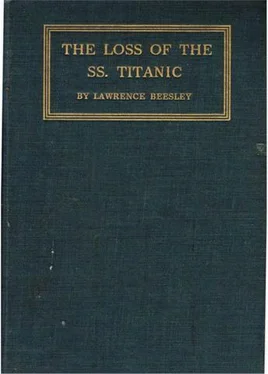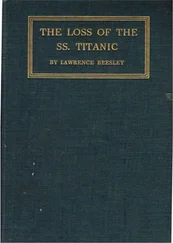Certainly it seems to express much more general nobility of character in a race of people—consisting of different nationalities—to find heroism an unconscious quality of the race than to have it arising as an effort of will, to have to bring it out consciously.
It is unfortunate that some sections of the press should seek to chronicle mainly the individual acts of heroism: the collective behaviour of a crowd is of so much more importance to the world and so much more a test—if a test be wanted—of how a race of people behaves. The attempt to record the acts of individuals leads apparently to such false reports as that of Major Butt holding at bay with a revolver a crowd of passengers and shooting them down as they tried to rush the boats, or of Captain Smith shouting, “Be British,” through a megaphone, and subsequently committing suicide along with First Officer Murdock. It is only a morbid sense of things that would describe such incidents as heroic. Everyone knows that Major Butt was a brave man, but his record of heroism would not be enhanced if he, a trained army officer, were compelled under orders from the captain to shoot down unarmed passengers. It might in other conditions have been necessary, but it would not be heroic. Similarly there could be nothing heroic in Captain Smith or Murdock putting an end to their lives. It is conceivable men might be so overwhelmed by the sense of disaster that they knew not how they were acting; but to be really heroic would have been to stop with the ship—as of course they did—with the hope of being picked up along with passengers and crew and returning to face an enquiry and to give evidence that would be of supreme value to the whole world for the prevention of similar disasters. It was not possible; but if heroism consists in doing the greatest good to the greatest number, it would have been heroic for both officers to expect to be saved. We do not know what they thought, but I, for one, like to imagine that they did so. Second Officer Lightoller worked steadily at the boats until the last possible moment, went down with the ship, was saved in what seemed a miraculous manner, and returned to give valuable evidence before the commissions of two countries.
The second thing that stands out prominently in the emotions produced by the disaster is that in moments of urgent need men and women turn for help to something entirely outside themselves. I remember reading some years ago a story of an atheist who was the guest at dinner of a regimental mess in India. The colonel listened to his remarks on atheism in silence, and invited him for a drive the following morning. He took his guest up a rough mountain road in a light carriage drawn by two ponies, and when some distance from the plain below, turned the carriage round and allowed the ponies to run away—as it seemed—downhill. In the terror of approaching disaster, the atheist was lifted out of his reasoned convictions and prayed aloud for help, when the colonel reined in his ponies, and with the remark that the whole drive had been planned with the intention of proving to his guest that there was a power outside his own reason, descended quietly to level ground.
The story may or may not be true, and in any case is not introduced as an attack on atheism, but it illustrates in a striking way the frailty of dependence on a man’s own power and resource in imminent danger. To those men standing on the top deck with the boats all lowered, and still more so when the boats had all left, there came the realization that human resources were exhausted and human avenues of escape closed. With it came the appeal to whatever consciousness each had of a Power that had created the universe. After all, some Power had made the brilliant stars above, countless millions of miles away, moving in definite order, formed on a definite plan and obeying a definite law: had made each one of the passengers with ability to think and act; with the best proof, after all, of being created—the knowledge of their own existence; and now, if at any time, was the time to appeal to that Power. When the boats had left and it was seen the ship was going down rapidly, men stood in groups on the deck engaged in prayer, and later, as some of them lay on the overturned collapsible boat, they repeated together over and over again the Lord’s Prayer—irrespective of religious beliefs, some, perhaps, without religious beliefs, united in a common appeal for deliverance from their surroundings. And this was not because it was a habit, because they had learned this prayer “at their mother’s knee”: men do not do such things through habit. It must have been because each one saw removed the thousand and one ways in which he had relied on human, material things to help him—including even dependence on the overturned boat with its bubble of air inside, which any moment a rising swell might remove as it tilted the boat too far sideways, and sink the boat below the surface—saw laid bare his utter dependence on something that had made him and given him power to think—whether he named it God or Divine Power or First Cause or Creator, or named it not at all but recognized it unconsciously—saw these things and expressed them in the form of words he was best acquainted with in common with his fellow-men. He did so, not through a sense of duty to his particular religion, not because he had learned the words, but because he recognized that it was the most practical thing to do—the thing best fitted to help him. Men do practical things in times like that: they would not waste a moment on mere words if those words were not an expression of the most intensely real conviction of which they were capable. Again, like the feeling of heroism, this appeal is innate and intuitive, and it certainly has its foundation on a knowledge—largely concealed, no doubt—of immortality. I think this must be obvious: there could be no other explanation of such a general sinking of all the emotions of the human mind expressed in a thousand different ways by a thousand different people in favour of this single appeal.
The behaviour of people during the hours in the lifeboats, the landing on the Carpathia, the life there and the landing in New York, can all be summarized by saying that people did not act at all as they were expected to act—or rather as most people expected they would act, and in some cases have erroneously said they did act. Events were there to be faced, and not to crush people down. Situations arose which demanded courage, resource, and in the cases of those who had lost friends most dear to them, enormous self-control; but very wonderfully they responded. There was the same quiet demeanour and poise, the same inborn dominion over circumstances, the same conformity to a normal standard which characterized the crowd of passengers on the deck of the Titanic—and for the same reasons.
The first two or three days ashore were undoubtedly rather trying to some of the survivors. It seemed as if coming into the world again—the four days shut off from any news seemed a long time—and finding what a shock the disaster had produced, the flags half-mast, the staring head-lines, the sense of gloom noticeable everywhere, made things worse than they had been on the Carpathia. The difference in “atmosphere” was very marked, and people gave way to some extent under it and felt the reaction. Gratitude for their deliverance and a desire to “make the best of things” must have helped soon, however, to restore them to normal conditions. It is not at all surprising that some survivors felt quieter on the Carpathia with its lack of news from the outside world, if the following extract from a leading New York evening paper was some of the material of which the “atmosphere” on shore was composed:—“Stunned by the terrific impact, the dazed passengers rushed from their staterooms into the main saloon amid the crash of splintering steel, rending of plates and shattering of girders, while the boom of falling pinnacles of ice upon the broken deck of the great vessel added to the horror…. In a wild ungovernable mob they poured out of the saloons to witness one of the most appalling scenes possible to conceive…. For a hundred feet the bow was a shapeless mass of bent, broken and splintered steel and iron.”
Читать дальше












